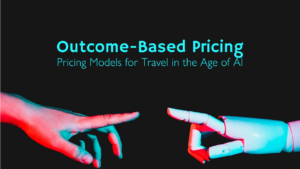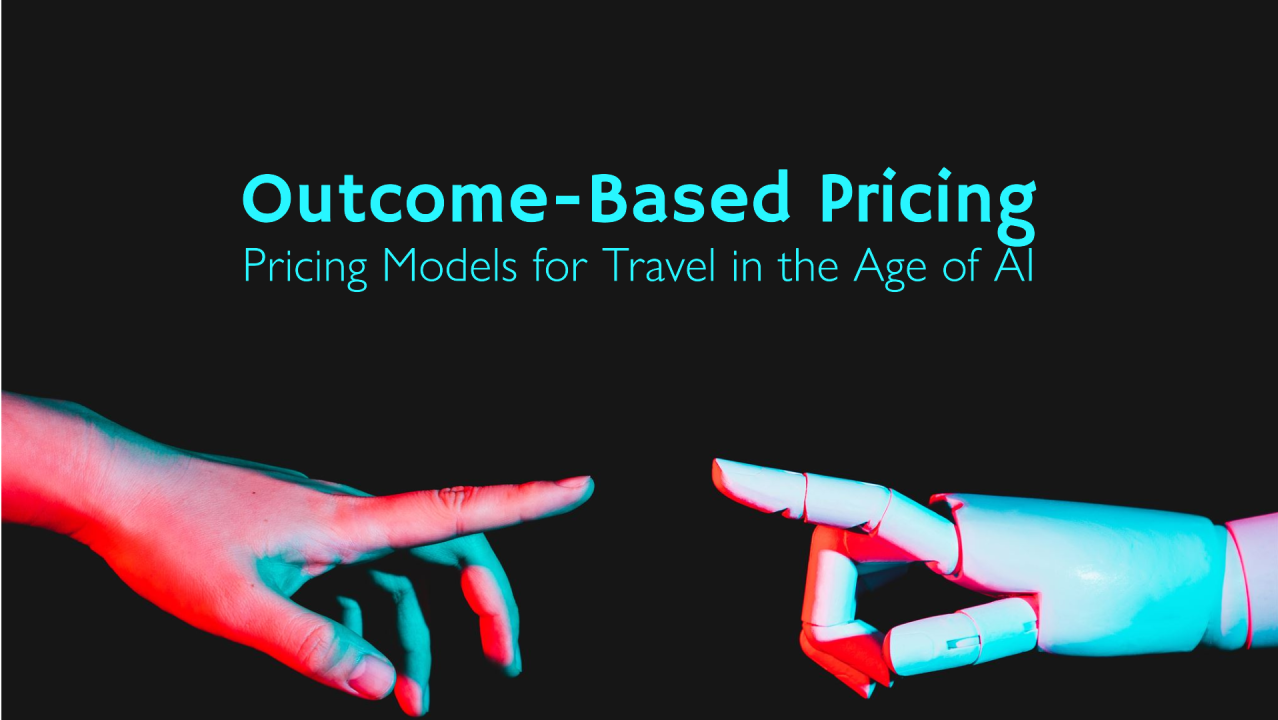As we end one frothy year in travel and begin a new one filled with optimism, now is the time to make bold proclamations about what this year has in store. Will we have less turbulence brought on by global conflicts, wars, and natural disasters? Or will we soar into clear skies as a wave of travel optimism expands our horizons about what is possible?
One thing that all those involved in the travel industry will surely agree upon — the age of AI is officially upon us.
Occupying my thoughts over these holidays has been the payment models we will experience within the agentic age.
Specifically, I have been pondering and asking myself… “As value is accrued into the application layer, what are the first- and second-order effects of a more efficient agentic network?”
But I am getting ahead of myself.
Looking Ahead, But Not Too Far Ahead
Imagine a world in the not-too-distant future when you are booking your next vacation through an AI-driven “Agent” that doesn’t just search for flights, vacation rentals, or hotels—it guarantees you results. Perhaps that means securing a specific hotel room in your favorite neighborhood under a set budget, or achieving a certain level of booking comfort and flexibility, or promising to score you a prime tee time at a golf course that is only available to be booked 30 days out (and not when you are making your flight and accommodation bookings).
In this vision of the future, you don’t pay a platform simply for searching, listing, or attempting to match your preferences.
Instead, payment only occurs once your desired outcome—an ideal itinerary booked at the best rate—is successfully delivered.
In 2025, we will enter the age of outcome-based pricing.
Outcome-based pricing is a model set to flourish in the travel industry as we transition toward increasingly intelligent and autonomous Agentic Networks.
From Fees for Listings to Paying for Results
For decades, the travel industry’s digital infrastructure—OTAs, metasearch engines, and booking platforms—has monetized by connecting travelers with suppliers and taking a commission when a reservation is completed.
At TravelAI, we have benefited nicely from these pricing models. We believe these “meta” travel companies (aggregating supply) have a natural head start in the outcome-based era. They’re already accustomed to delivering measurable results (e.g., a confirmed hotel booking or a reserved airline ticket) and directly receiving compensation tied to that success.
With emerging Agentic Networks, these players can go one step further.
Instead of just showing listings and accepting commissions after a purchase has been made, they can deploy autonomous AI Agents that negotiate, secure, and verify bookings in real time.
The traveler’s Agent might say, “Find me a four-star beachfront hotel in Phuket for under $200 per night.” The supplier’s Agent responds, “I can secure a four-star boutique resort with free breakfast at $190.” The aggregator’s platform—acting as the connecting fabric—only gets paid when the traveler’s criteria are met and the booking is confirmed. The transaction becomes purely outcome-driven, and the incentive alignment is crystal clear.
For the past 20 years in the age of SaaS-based pricing models where companies earn residual revenues (often paid per seat), companies were locked into paying for the right to participate and not the outcome obtained. This is highly inefficient, results in vendor lock-in, and frankly, does not have any tie-in to the value being created or the success being achieved.
In this next age of AI, we as an industry can do better.
First-Order Effects: Immediate Changes in Travel Transactions
- Reduced Upfront Risk for the Traveler: Instead of paying a subscription or upfront fees, travelers pay only when they get exactly what they want. No more guesswork—outcomes become the metric that triggers payment.
- Transparent Incentives for Suppliers and Platforms: Airlines, hotels, and booking platforms face a simple truth: get the traveler the desired result, or no payment changes hands. Everyone is motivated to deliver true value, not just eyeballs on listings.
- Data-Rich, AI-Driven Contracts: Thanks to AI, the moment a desired room is confirmed, the trigger for payment is automatic and transparent. Contracts between Agents become data-driven and instantaneous, cutting down on manual negotiations and dispute resolution.
Second-Order Effects: Reshaping the Travel Ecosystem
Over time, these immediate shifts will ripple out, fundamentally altering the competitive landscape and operational dynamics of travel.
- Reconfiguration of the Travel Ecosystem: As outcome-based pricing gains traction, travel marketplaces that verify and standardize performance metrics (think on-time check-ins, price guarantees, satisfaction scores) will emerge as the new infrastructure players. Their trusted data and standards can form the backbone of how millions of Agents interact.
- Specialized Agents and “Quality Auditors”: Just as some Agents focus on finding the best deals, others will specialize in verifying that outcomes match the contract. These “meta-agents” will serve as impartial referees, ensuring that when a traveler requests a beach-facing room with a balcony, what’s delivered truly meets that specification. [Note: There are tie-ins to decentralized trust networks and oracles here, but that is an article unto itself]
- A New Competitive Arena for Suppliers: Hotels, airlines, and tours that reliably deliver top-tier outcomes can command premium rates, since platforms and travelers know they’ll pay only when they get what’s promised. Conversely, suppliers that struggle to meet criteria may have to continually improve or risk losing business to outcome-savvy competitors.
- Continuous Innovation and Rapid Evolution: With compensation tied to performance, vendors will be highly motivated to improve. Expect accelerated investments in AI-based yield management, personalized recommendations, and dynamic packaging to ensure that what is promised is achievable and consistently delivered.
- Rebuilt Trust and a Culture of Transparency: In an outcome-based world, arguments about price or quality give way to data-backed facts. Travel planning becomes more reliable, less stressful, and ultimately more enjoyable—because every participant in the ecosystem is pulling in the same direction.
Why Aggregators Are Poised to Lead
Current travel aggregators already understand the art and science of matching demand with supply and verifying successful bookings. They’ve spent years refining commission structures, perfecting reservation engines, and building loyalty through trust and convenience.
As outcome-based pricing matures, these companies can seamlessly integrate intelligent Agents, leveraging their data and relationships to ensure that every metric—room quality, price parity, location accuracy—is transparent and verifiable.
A Vision of the Future
Picture yourself telling your digital travel Agent: “I want a two-week trip through Southern Spain, with boutique accommodations, cultural tours, and a budget cap of $3,000.”
Your Agent negotiates with various supplier Agents, and you see a final itinerary that meets or exceeds every criterion.
Only once you approve this perfect itinerary and it’s confirmed (“Swipe right to book”), the platform and suppliers get paid.
The process feels effortless, the trust implicit, and the outcome guaranteed.
Payments are split between all parties. Attribution is infallible, and marketers around the world raise their hands and shout ‘Hallelujah!”
The Bottom Line
Ai Agents are coming and they are coming quickly. What was projected as “coming soon in both 2023 and 2024, will be a reality in 2025.
The travel industry’s future will be shaped by intelligent Agents and outcome-based pricing. While the immediate changes will be meaningful, the deeper transformations will be seismic.
We’ll see a travel ecosystem that’s not just more efficient and transparent, but also more enjoyable and trustworthy.
For travelers, it promises better trips; for suppliers and platforms, fairer incentives; and for the entire travel industry, an exciting era of data-driven, outcome-focused innovation.
As both a traveler and builder of an agentic network, I can hardly wait.
John Lyotier, CEO
















